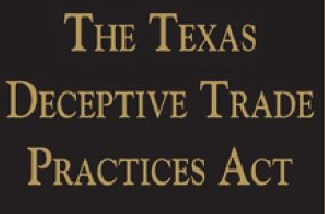 “’A mortgagor qualifies as a consumer under the DTPA if his or her primary objective in obtaining the loan was to acquire a good or service, and that good or service forms the basis of the
“’A mortgagor qualifies as a consumer under the DTPA if his or her primary objective in obtaining the loan was to acquire a good or service, and that good or service forms the basis of the
complaint.’ But a mortgagor challenging how an existing mortgage is serviced is not a consumer because the basis of the claim is ‘the subsequent loan servicing and foreclosure activities, rather than the goods or services acquired in the original transaction.’ Also, ‘[a]n activity related to a loan transaction is a ‘service’ for DTPA purposes only if the activity at issue is, from the plaintiff’s point of view, an objective of the transaction, not merely incidental to it.’
Appellant’s DTPA claim is not premised on any deceptive acts regarding the purchase of the property itself. Her claims––e.g., that appellees failed to provide her with an accurate accounting and failed to comply with an alleged oral agreement to delay foreclosure––are based on how the mortgage loan was administered or serviced.” Ebrahimi v. Caliber Home Loans, Inc., No. 05-18-00456-CV (April 15, 2019) (mem. op.) (citations omitted, emphasis added).
Category Archives: DTPA
 Ferreira v. Russell presented a swearing match between the named parties about the quality of certain construction materials. The Fifth Court found no evidence of nondisclosure about the use of “surplus or repurposed” materials, and thus reversed a DTPA recover, when:
Ferreira v. Russell presented a swearing match between the named parties about the quality of certain construction materials. The Fifth Court found no evidence of nondisclosure about the use of “surplus or repurposed” materials, and thus reversed a DTPA recover, when:
- Russell admitted that he did not ask Ferreira to use only new materials and that Ferreira did not specifically say the materials would all be new.
- When Russell was asked whether Ferreira told him he had a warehouse full of new equipment, he replied, “He said he had a warehouse with equipment.”
- As to the specific representation Ferreira made, Russell said he was told that the materials would be suitable for a commercial building and would meet code. Russell further admitted that he simply assumed the material would all be new or first class and that it would not have been used.
- Ferreira testified (without contradiction) that his company was doing the build-out for Russell because Russell could not afford any of the other companies they looked at, and thatFerreira was doing the work “for no profit.”
- According to Ferreira, both he and Russell knew that some of the materials used to build the store would be new, some would be surplus (unused materials left over from other projects), and some would be repurposed (used) so that they could keep the cost within Russell’s budget.
No. 05-16-01235-CV (Aug. 13, 2018) (mem. op.)
 The Hales sued their homebuilder for fraud and violation of the DTPA, alleging serious problems with the foundation of their Rockwall home (right). They substantially succeeded at trial, and the Dallas Court of Appeals affirmed in large part in Bishop Abbey Homes, Ltd. v. Hale, No. 05-14-00137-CV (Dec. 16, 2015) (mem. op.) In particular, the Court affirmed as to limitations – a significant issue in this long-simmering dispute – noting that “each time the Hales raised a concern about the foundation, they were assured by one of appellants’ experts that the foundation was not the cause of the problems the Hales observed.” The court also affirmed as to sufficiency challenges to liability, several claims of improper closing argument, and a challenge to the the basis of the exemplary damages award based on constitutional and Kraus factors. The court requested a remittitur as to (a) mental anguish damages (for sufficiency reasons) above $208,856 per plaintiff; and (b) a portion of the additional/exemplary damages award, based on the applicable cap and the conclusion that the total award “exceeds the guidelines set forth in [Bennett v. Reynolds, 315 S.W.3d 867 (Tex. 2010)] and [Tony Gullo Motors I, LP v. Chapa, 212 S.W.3d 299 (Tex. 2006)] for the type of harm suffered by the Hales as a result of appellants’ conduct.”
The Hales sued their homebuilder for fraud and violation of the DTPA, alleging serious problems with the foundation of their Rockwall home (right). They substantially succeeded at trial, and the Dallas Court of Appeals affirmed in large part in Bishop Abbey Homes, Ltd. v. Hale, No. 05-14-00137-CV (Dec. 16, 2015) (mem. op.) In particular, the Court affirmed as to limitations – a significant issue in this long-simmering dispute – noting that “each time the Hales raised a concern about the foundation, they were assured by one of appellants’ experts that the foundation was not the cause of the problems the Hales observed.” The court also affirmed as to sufficiency challenges to liability, several claims of improper closing argument, and a challenge to the the basis of the exemplary damages award based on constitutional and Kraus factors. The court requested a remittitur as to (a) mental anguish damages (for sufficiency reasons) above $208,856 per plaintiff; and (b) a portion of the additional/exemplary damages award, based on the applicable cap and the conclusion that the total award “exceeds the guidelines set forth in [Bennett v. Reynolds, 315 S.W.3d 867 (Tex. 2010)] and [Tony Gullo Motors I, LP v. Chapa, 212 S.W.3d 299 (Tex. 2006)] for the type of harm suffered by the Hales as a result of appellants’ conduct.”
Sylvester Davis sued TexPro Construction Group after the contractor failed to complete a backyard construction project. When TexPro failed to file an answer, Davis sought and obtained a partial default judgment on liability. TexPro then answered, but Davis moved forward with a hearing to establish damages. TexPro did not appear at the hearing, and the trial court awarded judgment for $117,230 in compensatory damages, treble damages under the DTPA and $350,000 in exemplary damages. After blowing through the deadlines for an ordinary appeal, TexPro hired new counsel and filed a restricted appeal. The Court of Appeals held that there was no error on the face of the record just because TexPro’s registered agent had been served at a location different from the address listed on the citation. The Court also held that there was no error in the trial court’s decision to move forward with the damages hearing, since the filing of TexPro’s answer did not negate the previously-signed default judgment on liability. However, Davis’ testimony on damages was the full amount of the money paid to TexPro, without accounting for the value of the work that TexPro had actually performed. Because his affidavit testimony was conclusory in alleging that the work done was valueless, the Court of Appeals reversed and remanded for a new trial on damages.
TexPro Constr. Group, LLC v. Davis, No. 05-14-00050-CV
The Weavers hired attorney Holliday to pursue claims relating to a car accident. The Weavers later sued Holliday for breach of fiduciary duty, professional negligence, fraud, and violation of the DTPA, alleging that Holliday settled an insurance claim without the Weavers’ consent and converted the money for personal use. The trial court found in favor of the Weavers on all four claims, and the Weavers elected to recover on the DTPA claim. The Court of Appeals reversed the trial court’s judgment on the DTPA claim, and rendered judgment for the Weavers on the breach of fiduciary duty claim. The Court of Appeals noted that there was “no evidence that [Holliday’s] acceptance of the settlement payments…or his attorney’s fees, constituted a pecuniary loss to the Weavers that was caused by Holliday’s DTPA violations as opposed to the other claimed wrongful conduct.” Thus, the evidence was legally insufficient to support the award of damages under the DTPA because there was no evidence that the DTPA violations were a producing cause of the Weavers’ claimed pecuniary loss.
Holliday v. Weaver, No. 05-10-01614-CV
AdvoCare employed Plaintiffs as distributors to sell its products. Under this distribution arrangement, these distributors earned commissions based on products sold both to consumers and to other distributors “down line.” But AdvoCare could choose not to renew these distributorships every year, and it retained the right to terminate its distributors if they breached certain conditions. When AdvoCare terminated each of the Plaintiffs for failing to comply with these very conditions, Plaintiffs brought claims for breach of contract, fraud, unjust enrichment, and for violations of the Deceptive Trade Practices Act. The jury found for the Plaintiffs on the DTPA claim only.
AdvoCare appealed because, it argued, the Plaintiffs were not “consumers,” and the DTPA expressly limits recovery to situations where (1) consumers acquired goods or services by purchase or lease and (2) the goods or services purchased or leased form the basis of the complaint. Examining the record, the Court of Appeals found that Plaintiffs’ claim rested almost entirely on the wrongful termination of their distributorships. Indeed, the Court pointed out that “the sole basis for the claimed damages is the value of each distributorship as of the date AdvoCare terminated their distributorships.” Because “[n]either the termination nor the lost value is tied to any alleged defective product or service,” the DTPA claim fails.
Advocare International LP v. Ford, et al. No. 05-10-00590-CV
Van Peterson entered into a contract with ADT to provide commercial alarm services to his jewelry store. Allegedly, an unidentified man wearing an ADT uniform and driving an ADT van came to the jewelry store and sold Van Peterson a device for its alarm system, but instead of installing the device, the man disabled the alarm. Van Peterson’s store was burgled soon after. Van Peterson brought various tort, fraud and DTPA claims against ADT. ADT filed a traditional motion for summary judgment on the tort claims, arguing that Van Peterson waived liability for these claims in the contract, and a no-evidence motion on the other claims. The trial court eventually denied the motions but permitted an interlocutory appeal under former section 51.014(d) of the Texas Civil Practice and Remedies Code.
On appeal, the court first held that ADT could not raise issues first advanced in its reply in support of its no-evidence motion for summary judgment. The court reversed the trial court’s denial of summary judgment on the tort claims because the parties’ contract included a limitation-of-liability provision as to those claims. Such waivers are not invalidated by the DTPA, which only limits waivers of DTPA claims. Finally, the court held that ADT could not challenge on appeal Van Peterson’s subrogated insurer’s pursuit of a DTPA claim because only Van Peterson was a party to the litigation and any opinion as to the insurer would be advisory.
ADT Security Services, Inc. v. Van Peterson Fine Jewelers, No. 05-11-01468-CV